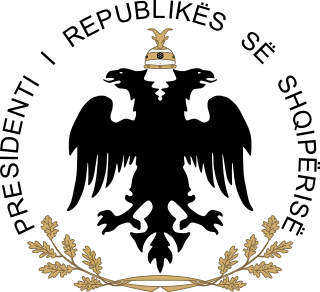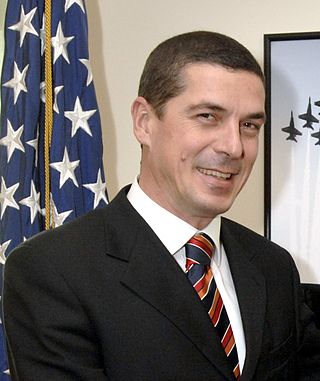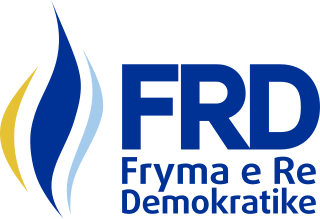| |||||
| Decades: | |||||
|---|---|---|---|---|---|
| See also: | Other events of 2008 List of years in Albania | ||||
The following lists events that happened during 2008 in Republic of Albania .
| |||||
| Decades: | |||||
|---|---|---|---|---|---|
| See also: | Other events of 2008 List of years in Albania | ||||
The following lists events that happened during 2008 in Republic of Albania .
Albania is a unitary parliamentary constitutional republic, in which the president of Albania is the head of state and the prime minister of Albania is the head of government in a multi-party system. The executive power is exercised by the Government and the prime minister with its Cabinet. Legislative power is vested in the Parliament of Albania. The judiciary is independent of the executive and the legislature. The political system of Albania is laid out in the 1998 constitution. The Parliament adopted the current constitution on 28 November 1998. Historically Albania has had many constitutions. Initially constituted as a monarchy in 1913, Albania became briefly a republic in 1925, and then a authoritarian monarchy in 1928. In 1939 Albania was invaded by Fascist Italian forces, imposing a puppet state, and later occupied by Nazi German forces. Following the partisan liberation from the Nazis in 1944 a provisional government was formed, which by 1946 had transformed into a communist one-party state. In March 1991 democracy was restored with multi-party elections.
In political science, a constitutional crisis is a problem or conflict in the function of a government that the political constitution or other fundamental governing law is perceived to be unable to resolve. There are several variations to this definition. For instance, one describes it as the crisis that arises out of the failure, or at least a strong risk of failure, of a constitution to perform its central functions. The crisis may arise from a variety of possible causes. For example, a government may want to pass a law contrary to its constitution; the constitution may fail to provide a clear answer for a specific situation; the constitution may be clear but it may be politically infeasible to follow it; the government institutions themselves may falter or fail to live up to what the law prescribes them to be; or officials in the government may justify avoiding dealing with a serious problem based on narrow interpretations of the law. Specific examples include the South African Coloured vote constitutional crisis in the 1950s, the secession of the southern U.S. states in 1860 and 1861, the dismissal of the Australian federal government in 1975 and the 2007 Ukrainian crisis. While the United Kingdom of Great Britain and Northern Ireland does not have a codified constitution, it is deemed to have an uncodified one, and issues and crises in the UK and its constituent countries are described as constitutional crises.

Sali Ram Berisha is an Albanian cardiologist and conservative politician who served as the president of Albania from 1992 to 1997 and 32nd prime minister from 2005 to 2013. Berisha serves as Chairman of the Democratic Party of Albania since 2022 and has held the position previously from 1990 to 2013. He also serves as the incumbent Leader of Opposition in the Albanian parliament.

The president of Albania, officially styled the President of the Republic of Albania, is the head of state, commander-in-chief of the military and the representative of the unity of the Albanian people.

Fatos Thanas Nano is an Albanian socialist politician who served as Prime Minister of Albania in 1991, from 1997 to 1998 and from 2002 to 2005. He was the first leader and founder of the Socialist Party of Albania and a member of the Albanian Parliament from 1991 to 1993 and 1997 to 2009. He reformed the anti-revisionist Marxist-Leninist ideology of the Labor Party of Albania into social democracy for its successor, the Socialist Party. During his leadership, the Socialist Party, as a result of reforms, joined the Socialist International and Party of European Socialists. Nano was a candidate in the 2007 presidential election but did not win. He again tried in the 2012 presidential election, but he did not even qualify as a candidate, because the leaders of parties in Parliament obstructed their respective MPs to elect him as candidate in the elections.

Azem Shpend Hajdari was the leader of the student movement in 1990–1991 that led to the fall of communism in Albania. He then became a politician of the Democratic Party of Albania (DP). He symbolizes the start of the democratic era in Albania. He was a member of the Albanian parliament and the Chairman of the Defence Parliamentary Commission. He was shot to death in Tirana on September 12, 1998 at age 35.

The Politics of Serbia are defined by a unitary parliamentary framework that is defined by the Constitution of Serbia in which the president, currently Aleksandar Vučić, is the head of state while the prime minister, currently Miloš Vučević, is the head of government. Executive power is exercised by the Serbian government and the President of Serbia. Legislative power is vested in the unicameral National Assembly which is composed of 250 proportionally elected deputies. The judiciary is independent and is headed by the Supreme Court of Cassation, which is also the highest court in Serbia.
Indirect presidential elections were held in Albania on 20 and 27 June, 8, 11, 14, and 20 July, the sixth such elections since the collapse of the communist regime in 1991.

Bamir Myrteza Topi is an Albanian diplomat and politician. He served as the president of Albania from July 2007 to July 2012.
Events from the year 2007 in Albania.

Gazmend Oketa is an Albanian politician. He served as Deputy Prime Minister of Albania, as well as Minister of Defence.
In 1991, the Socialist Party of Albania, with specific social democratic ideology took control of the country through democratic elections. One year later the Democratic Party of Albania won the new elections. After 1990, Albania has been seeking a closer relationship with the West. What followed were deliberate programs of economic and democratic reform, but the implementation of capitalism led to the proliferation of pyramid schemes. Chaos in late 1996 to early 1997, as a result of the collapse of these pyramid schemes, alarmed the world and prompted the influx of international peacekeeping forces. In 1995, Albania was accepted into the Council of Europe and requested membership in NATO and is a potential candidate country for accession to the European Union. The workforce of Albania has continued to emigrate to Western countries, especially Greece and Italy.

The "Gjergj Kastrioti Skënderbeu" Decoration is a high honorary state decoration that is currently awarded to Albanian and foreign citizens in Albania, that have made an important contribution to the defence, reinforcement and development of the Republic of Albania.

Slobodan Petrović is a Kosovo Serb politician and former Deputy Prime Ministers of the Republic of Kosovo. He was a member of the Kosovo Assembly and until 2020 he was the head of the Independent Liberal Party (SLS)..
The following lists events from the year 2011 in Albania.

The New Democratic Spirit is a centre-right conservative political party in Albania. New Democratic Spirit was created by Gazmend Oketa, the former Deputy Prime Minister and Defense Minister of the Republic of Albania, and other former members of the Democratic Party of Albania. Albanian media call it "the President's Party", referring to Albanian President Bamir Topi.
A hunger strike by former politically persecuted persons of Albania began on 21 September 2012 in Tirana involving 20 people persecuted during the communist years. The strike began for economic purposes, seeking the Albanian government to compensate them according to a law passed in 2007 entitling former political prisoners to 2,000 lek for each day they were in prison.
The following lists events that happened during 2010 in Republic of Albania.
The following lists events that happened during 2012 in the Republic of Albania.
The following lists events that happened during 2009 in Republic of Albania.